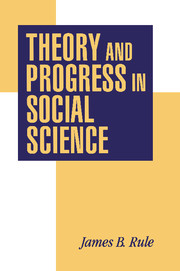5 - Network analysis
Published online by Cambridge University Press: 05 November 2011
Summary
Network analysis, writes one of its enthusiasts (Knoke 1990), “forms the cutting edge of theory and research” in political studies. “By uncovering these latent deep structures,” he continues:
analysts can reveal the subtle ways that power relations shape perceptions, motives, thoughts and actions. Once acquired, the conceptual reorientation required by network thinking about politics cannot be easily relinquished. Social scientists and policymakers alike will come to see the world as a fantastic web of strong and weak connections running from primary groups through organizations, communities, and nations. … The new world of political economy is at hand. … (1990, p. 232)
These words epitomize the energizing vision of intellectual progress shared by proponents of network thinking. Similar statements could of course be quoted from proponents of countless other theoretical programs. But in the case of network analysis, such claims have recently won particularly wide assent among social scientists. For many, this relatively new theoretical program represents the state of the art, the clearest manifestation of the advance of knowledge in our disciplines.
For the purposes of this book, all of this holds much interest. Network thinking obviously embodies a distinctive model of closure in the sense discussed in Chapter 1. In the last decades of the century, it has attained intellectual sex appeal approaching that of structural functionalism in the 1950s.
- Type
- Chapter
- Information
- Theory and Progress in Social Science , pp. 120 - 143Publisher: Cambridge University PressPrint publication year: 1997

